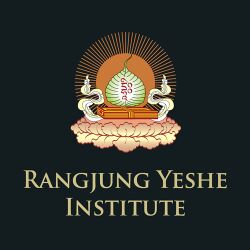Category:Rangjung Yeshe Institute
Rangjung Yeshe Institute
Founded by Chokyi Nyima Rinpoche as an institution of higher learning for those wishing to deepen their understanding of Buddhist philosophy and practice, Rangjung Yeshe Institute (RYI) has been conducting seminars and study programs in Nepal for more than 25 years.
Since 2001, the Institute has worked in close partnership with Kathmandu University to manage the Kathmandu University Centre for Buddhist Studies at Rangjung Yeshe Institute which offers undergraduate and post-graduate degree courses in Buddhist Studies and related topics.
RYI may, to a large extent, be regarded as the Buddhist equivalent of a divinity school or seminary where spiritual practice is an integral part of the daily experience and where program graduates are scholar-practitioners.In the first talk, he explains what marks the beginning of the bodhisattva path and the distinction between a noble bodhisattva and an aspiring bodhisattva. Furthermore, he explains the difference between emotional compassion and wisdom-based compassion. He introduces the four means of magnetizing, a skillful method used by Bodhisattvas to benefit others.
In the second talk, he expands on the four means of magnetizing; generosity, pleasant speech, teaching according to the needs of beings, and being consistent in conduct. He explains how noble bodhisattvas implement these methods and provides practical advice to aspiring bodhisattvas on how to engage with them. The translation is by RYI's translator, Anya Zilman. (Source Accessed Sep 30, 2020)Modern scholarship on the Five Treatises has so far privileged studying the texts of the Five Treatises individually, not giving much importance to the concept of the Five Treatises per se and its consequences on the interpretation of the texts that form it. In the following pages I argue that, on the contrary, the notion of the Five Treatises and the idea that they form a unit is crucial enough for Tibetan interpreters that we cannot fully understand Tibetan interpretations of those texts without taking this into consideration. If we look at the way Tibetan interpreters define the category and how they form their interpretations around it, we come to the conclusion that a study of Tibetan interpretations of individual treatises cannot represent fully the influence of those texts on Tibetan Buddhist literature and thought
In order to establish that claim, having explained the concept of the Five Treatises as a unit and where that unit fits among Tibetan Buddhist scriptures, I will trace its origin and development from the recognition of Maitreya’s authorship of the Treatises to the notion that the Five Treatises form a single work. I will conclude by explaining how the study of the Five Treatises as a whole and of that concept itself allows us to understand things that the study of the texts individually cannot provide. (Turenne, introduction, 215–16)
Lama Shenpen Hookham speaks with students at RYI about the Shentong interpretation of Tathāgatagarbha on April 15, 2019.
Given the disregard many lamas and yogis have had towards the soteriological efficacy of epistemology, one may come to the false conclusion that epistemology is only relevant to the context of debate, without any application to meditation practice and the path to liberation. However, one can clearly see that this is not completely true, since Dharmakīrti (c. 600 CE), who is arguably Buddhism’s most influential epistemologist, provides an account of how a practitioner may attain the liberative cognition known as yogic direct valid means of cognition (rnal ’byor mngon sum tshad ma, hereafter referred to as yogic perception). In Tibet, the dGe lugs pa-s are particularly known for their soteriological use of epistemology, which is unsurprising given their emphasis on scholarship, but there are even thinkers in the meditation- oriented bKa’ brgyud school who have a soteriologically-oriented take on epistemology.
The aim in thesis is to show how bKa’ brgyud epistemologists’ (most notably, the Seventh Karma pa’s (1454-1506)) view on yogic perception differs from that of Dharmakīrti and the dGe lugs pa-s, since most western scholarship on Buddhist epistemology has focused on them. Like Dharmakīrti and the dGe lugs pa-s, the Seventh Karma pa describes the gradual path to attaining yogic perception through inference and familiarization, although there are striking differences in their understandings of the nature of what is observed in this type of perception. His epistemology is not only relevant to the scholarly path of inference, as one finds with most epistemologists, however. His view on reflexive awareness represents a common ground between the theory attached to Mahāmudrā, and pramāṇa, which allows for an epistemological explanation of the Mahāmudrā method of “taking direct perception as the path.” Through showing first, how his view of yogic perception differs from Dharmakīrti and the dGe lugs pa-s,and secondly, how his view concerning reflexive awareness is connected to Mahāmudrā, I wish to show the unique characteristics of the Seventh Karma pa’s brand of soteriological epistemology.
Prof. Dr. Klaus-Dieter Mathes is a professor of Tibetan and Buddhist Studies at the University of Vienna. His research interests include the Indian origin of the Tibetan Mahāmudrā traditions, buddha nature and the Tibetan gzhan stong tradition. He spoke with students at RYI on April 3, 2018. (Source Accessed Aug 13, 2020)
Pages in category "Rangjung Yeshe Institute"
The following 5 pages are in this category, out of 5 total.

